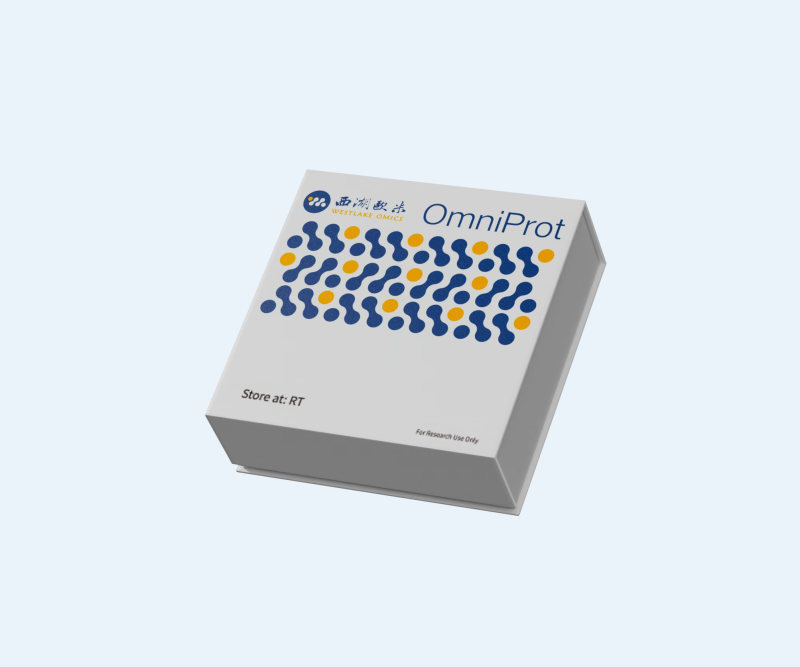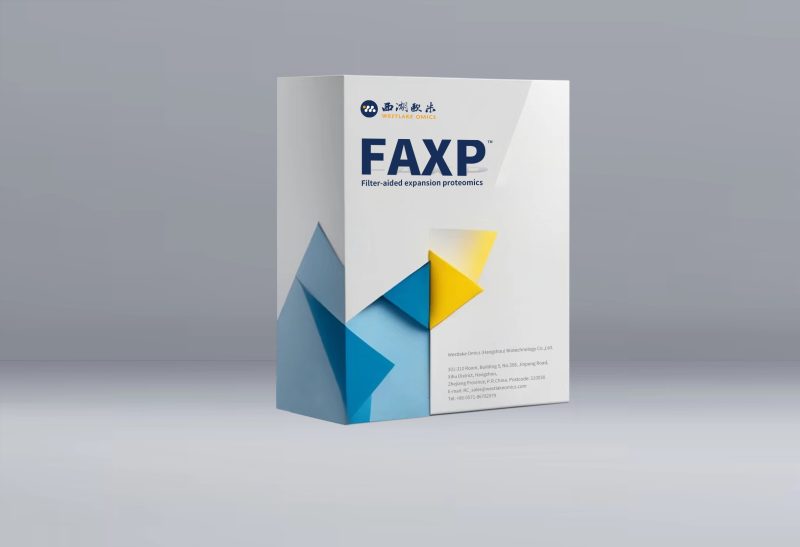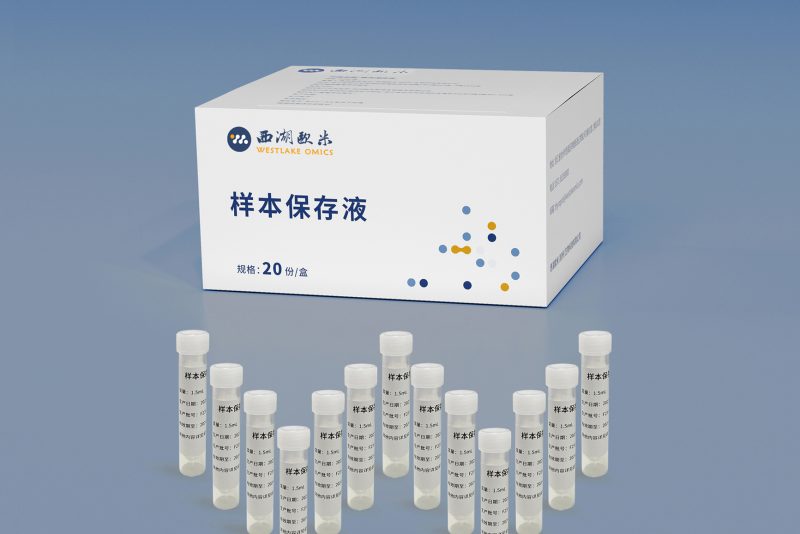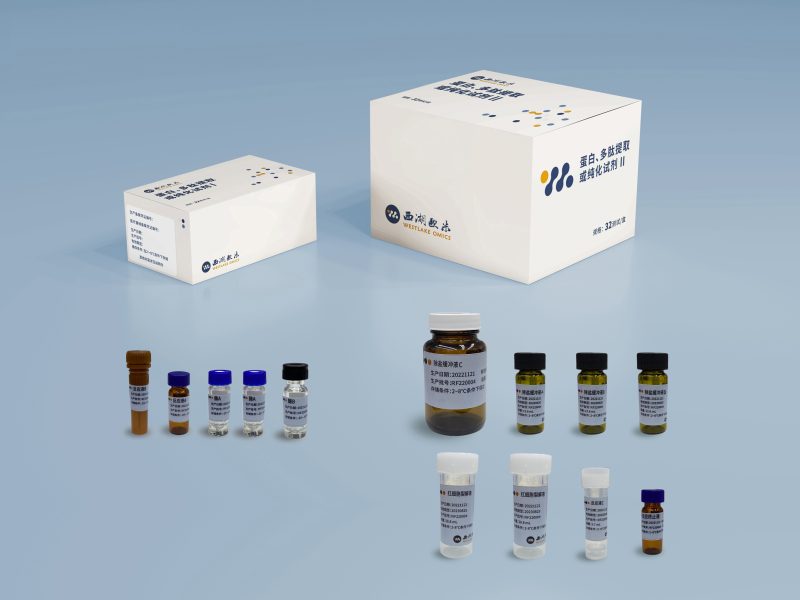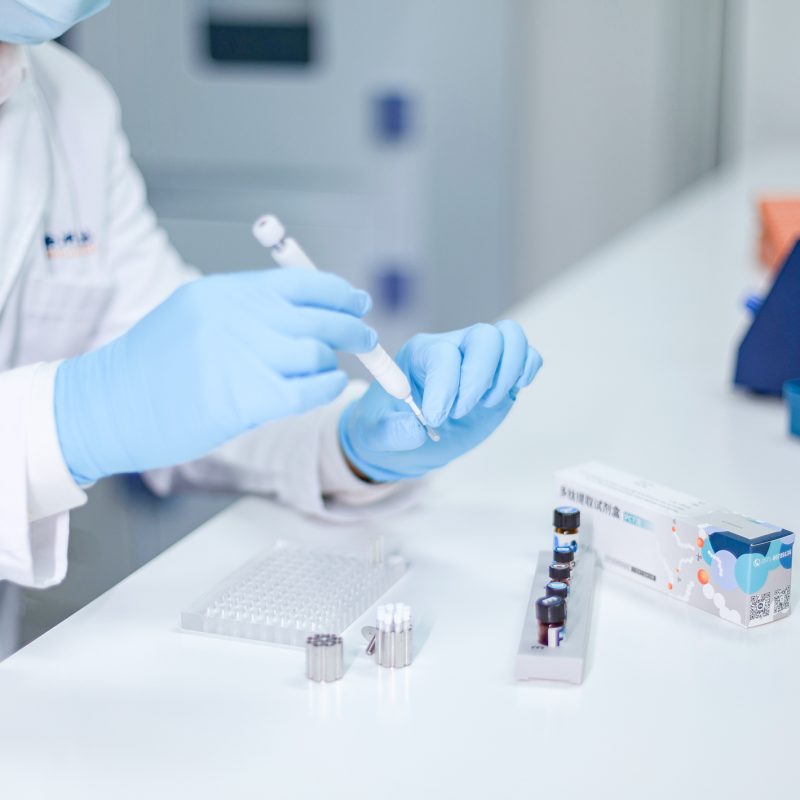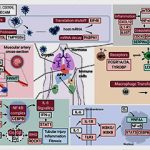Westlake Omics, propped by the combination of big proteomic data and AI, is dedicated to breakthroughs in auxiliary clinical diagnostics based on proteomics and other molecular genomics, propelling accurate auxiliary diagnosis of major human diseases such as tumors. Westlake Omics Biotechnology Co., Ltd., has recently raised fund amounting to tens of millions of RMB in its seed round, financed by CD Capital and Gaorong Capital as lead investors and GL Ventures as the co-investor. Such impressive success is attributed to the Guomics Laboratory of Big Proteomic Data at Westlake University that provides the core technology, and the Technology & Commercialization Service Center of Westlake University that has underpinned it throughout.
The Guomics Laboratory of Big ProteomicData, in collaboration with its collaborative teams, has previously pioneered in completion of analyzing the serum proteome and metabolome of confirmed cases in mild and critical condition of COVID-19, followed which it discovered a series of characteristics and important biomarkers in seriously ill patients, and mapped the world's first panorama of the molecular regulation of multi-organ proteins in COVID-19 deaths. All related findings have been published in Cell Journal.
Origin Story of Westlake Omics
It is the thyroid gland sitting low on the front of the neck that rises and falls during a swallow. The very first project that is expected to achieve clinical translation at Westlake Omics is the diagnosis of benign and malignant thyroid nodules based on protein markers.
Despite its small size, thyroid gland has its influences traveling to all five organs. As statistics point out, 1 out of 5 adults may have thyroid nodules, of whom approximately 60% have benign ones, 10% suffer from malignant, and the remaining 30% or so are left difficult to classify, either through blood tests, B scan, CT or a puncture biopsy of thyroid tissue. An extraordinary number of people have to opt for surgical removal, at the cost of a life time of medication to supplement thyroxine that keeps the body's thyroid hormones at normal levels. Overseas figures demonstrate that 70-80% of patients who have their thyroid gland removed needn’t have undergone such miserable operation (as it turned out to be false positive in such a high percentage of cases).
Scientists used to bet on genetic testing as solution to this problem. Yet a decade of attempts was no other than a disappointment, as the specificity that can be achieved by genetic diagnosis ranges only around 10% to 50%, mainly due to the low malignancy of thyroid nodules, and its infrequent and insignificant alterations at the genetic level.
Dr. Tiannan Guo, a renowned proteomics expert, has resorted to "proteins" as a way out in such context.
A person sees its genes unchanged all the way either from cradle to grave, or withering from health to being tormented by disease. Protein, however, follows a different trajectory. It alters as human body,where it is situated, are in different states of health. The tricky part is that such changes are extremely subtle. So how can they be detected?
Dr. Tiannan Guo stresses: "We recognise a person by their facial features in the macroscopic world, but it doesn’t work at the molecular level. All proteins, even visible ones, are very difficult to distinguish accurately because of their complex structure. We identify what kind of protein it is by measuring its weight. This 'scale' that weighs the protein is called mass spectrometer, and its up-to-date generation can achieve an accuracy of about 30 decimal places (kg), such precision contributed by a large number of mathematical calculations, including multiple physical and chemical processes."
Despite such achievement, the differentiation between benign and malignant nodules is still challenging to tell, because such differences are determined by the complex relationship of numerous factors in the mass spectrometry data, a problem of pattern recognition. This is where Dr. Ziqing Li excels, an well-recognized expert in AI at Westlake University.
In the view of Dr. Li, distinguishing benign from malignant thyroid nodules by mass spectrometry data is like fumbling between "two" similar-looking faces from a single image. The research team applied a machine learning approach to select a total of 2,622 meaningful protein candidates from the raw mass spectrometry data and built a unique algorithm for proteomic data propped by neural network technology. Proteomic numbers of such 2,622 potential proteins were entered into this model, after which approximately 2*1019 calculations were performed to identify the 20 key proteins that would assist doctors to identify a patient's nodules.The model scores the overall profile of these 20 proteins (on a scale of 0-1): the nodule is classified as malignant when the composite score is greater than or equal to 0.5, and benign if it is less than 0.5. Clinical trials have shown that this assay has a combined accuracy of 89%.
Proteomics + AI Technology
Application Scenarios in the Future - FarBeyond Thyroid Nodules
Proteomics, an emerging discipline, is applauded as another inspiring breakthrough that follows genomics and transcriptomics in mankind's quest to understand the mysteries of life activities. Almost all human life activities are performed by proteins in the human body, and the effectiveness of disease treatment also depends on the regulation of proteinmachines. In this sense, thyroid nodule is merely the starting point for the application of proteomics plus AI technology, with more to expect.
A case tha tstands out is to screen for drugs as we treat tumours. Dying to Survive, a movie directed by Zheng Xu, was shot centering around a type of leukaemia called chronic myeloid leukaemia, where almost 90% of these patients develop a special fusion protein named BCR-ABL. Scientists have developed a drug called Imatinib that can effectively inhibit the function of this fusion protein, with effectiveness rate as high as more than 90%. As researches have shown, each tumour may have one or more of these disease-causing abnormal proteins, and they may also change as the disease progresses. At this very moment the very right drug can to be administered if the abnormal proteinat the current stage of the disease is pinpointed in real time propelled by the combination of proteomics and AI technology.
Proteomics is in the middle of shaping the next lucrative biomedical sector
All through the scientific translation in the Guomics Laboratory of Big Proteomic Data, the Technology & Commercialization Service Center of Westlake University has played acrucial role as incubator and accelerator, speeding up the commercialization by providing comprehensive and in-depth service ranging from technology protection, policy consultation, legal services,financing advice and team building. It is a firm belief that proteomics will live up to its greater potential for application in the field of precision medicine, as molecular medicine, big data technology and AI have been advancing in a fascinating pace.
Westlake Omics
Dr. Tiannan Guo, founder of Westlake Omics, put: " Around the corner is the prime age of proteomics for a wide range of applications in precision medicine. Our mission is to accurately quantify as many proteins as possible from the smallest possible amount of biological samples in the shortest possible time, and then resolve the mathematical laws of lifeactivities, ultimately achieving proteomic-based precision medicine. In the future, we will volunteer to tackle the world's technical challenges persistently and push ourselves beyond what's expected, on the way to facilitate accurate auxiliary diagnosis of major human diseases."
CD Capital
Very optimistic about this area of research.
"Proteins play a pivotal role in life activities, yet proteomics industry is still at a relatively early stage of development compared to the booming development of the genome and transcriptome over the past decade, therefore we can see inestimable potential in proteomics.Westlake Omics is well-equipped, either its globally competitive technology reserve or its ambitious vision to rise to the spear head in proteomics worldwide,“ CD Capital stated.
Gaorong Capital
Bullish about the multi-omics translation and application clinically.
"Proteomics, in the wake of genomics and transcriptomics, works as a brand new window to the genetic mystery under human exploration. Embedded within it are a vast number of unknowns that may bring brand new understanding to clinical treatment, drug development, disease prevention, and prognosis management. We are confident that the data will bring huge breakthroughs as it culminates, and that China's rich local clinical resources will give rise to world-class Chinese multi-omics enterprises," Gaorong Capital stated.
GL Ventures
GL Ventures, spin-off of HillhouseCapital, is a venture capital fund focusing start-up companies that are on their early stage. It specializes in four major sectors, namely biopharmaceuticals and medical devices, software and hard technologies,consumer internet and technologies, and emerging consumer brands and services.The first area has been the top priorityfor GL Ventures, which has invested in more than 200 outstanding biopharmaceutical, medical device and healthcare service companies over thepast decade. We are willing to join hand in hand with enterprises, take along-term perspective, and promote the innovation and development of big health companies in the hope of bringing benefits to more patients.
Westlake Omics, propped by the combination of big proteomic data and AI, is dedicated to breakthroughs in auxiliary clinical diagnostics based on proteomics and other molecular genomics, propelling accurate auxiliary diagnosis of major human diseases such as tumors. Westlake Omics Biotechnology Co., Ltd., has recently raised fund amounting to tens of millions of RMB in its seed round, financed by CD Capital and Gaorong Capital as lead investors and GL Ventures as the co-investor. Such impressive success is attributed to the Guomics Laboratory of Big Proteomic Data at Westlake University that provides the core technology, and the Technology & Commercialization Service Center of Westlake University that has underpinned it throughout.
The Guomics Laboratory of Big ProteomicData, in collaboration with its collaborative teams, has previously pioneered in completion of analyzing the serum proteome and metabolome of confirmed cases in mild and critical condition of COVID-19, followed which it discovered a series of characteristics and important biomarkers in seriously ill patients, and mapped the world's first panorama of the molecular regulation of multi-organ proteins in COVID-19 deaths. All related findings have been published in Cell Journal.
Origin Story of Westlake Omics
It is the thyroid gland sitting low on the front of the neck that rises and falls during a swallow. The very first project that is expected to achieve clinical translation at Westlake Omics is the diagnosis of benign and malignant thyroid nodules based on protein markers.
Despite its small size, thyroid gland has its influences traveling to all five organs. As statistics point out, 1 out of 5 adults may have thyroid nodules, of whom approximately 60% have benign ones, 10% suffer from malignant, and the remaining 30% or so are left difficult to classify, either through blood tests, B scan, CT or a puncture biopsy of thyroid tissue. An extraordinary number of people have to opt for surgical removal, at the cost of a life time of medication to supplement thyroxine that keeps the body's thyroid hormones at normal levels. Overseas figures demonstrate that 70-80% of patients who have their thyroid gland removed needn’t have undergone such miserable operation (as it turned out to be false positive in such a high percentage of cases).
Scientists used to bet on genetic testing as solution to this problem. Yet a decade of attempts was no other than a disappointment, as the specificity that can be achieved by genetic diagnosis ranges only around 10% to 50%, mainly due to the low malignancy of thyroid nodules, and its infrequent and insignificant alterations at the genetic level.
Dr. Tiannan Guo, a renowned proteomics expert, has resorted to "proteins" as a way out in such context.
A person sees its genes unchanged all the way either from cradle to grave, or withering from health to being tormented by disease. Protein, however, follows a different trajectory. It alters as human body,where it is situated, are in different states of health. The tricky part is that such changes are extremely subtle. So how can they be detected?
Dr. Tiannan Guo stresses: "We recognise a person by their facial features in the macroscopic world, but it doesn’t work at the molecular level. All proteins, even visible ones, are very difficult to distinguish accurately because of their complex structure. We identify what kind of protein it is by measuring its weight. This 'scale' that weighs the protein is called mass spectrometer, and its up-to-date generation can achieve an accuracy of about 30 decimal places (kg), such precision contributed by a large number of mathematical calculations, including multiple physical and chemical processes."
Despite such achievement, the differentiation between benign and malignant nodules is still challenging to tell, because such differences are determined by the complex relationship of numerous factors in the mass spectrometry data, a problem of pattern recognition. This is where Dr. Ziqing Li excels, an well-recognized expert in AI at Westlake University.
In the view of Dr. Li, distinguishing benign from malignant thyroid nodules by mass spectrometry data is like fumbling between "two" similar-looking faces from a single image. The research team applied a machine learning approach to select a total of 2,622 meaningful protein candidates from the raw mass spectrometry data and built a unique algorithm for proteomic data propped by neural network technology. Proteomic numbers of such 2,622 potential proteins were entered into this model, after which approximately 2*1019 calculations were performed to identify the 20 key proteins that would assist doctors to identify a patient's nodules.The model scores the overall profile of these 20 proteins (on a scale of 0-1): the nodule is classified as malignant when the composite score is greater than or equal to 0.5, and benign if it is less than 0.5. Clinical trials have shown that this assay has a combined accuracy of 89%.
Proteomics + AI Technology
Application Scenarios in the Future - FarBeyond Thyroid Nodules
Proteomics, an emerging discipline, is applauded as another inspiring breakthrough that follows genomics and transcriptomics in mankind's quest to understand the mysteries of life activities. Almost all human life activities are performed by proteins in the human body, and the effectiveness of disease treatment also depends on the regulation of proteinmachines. In this sense, thyroid nodule is merely the starting point for the application of proteomics plus AI technology, with more to expect.
A case tha tstands out is to screen for drugs as we treat tumours. Dying to Survive, a movie directed by Zheng Xu, was shot centering around a type of leukaemia called chronic myeloid leukaemia, where almost 90% of these patients develop a special fusion protein named BCR-ABL. Scientists have developed a drug called Imatinib that can effectively inhibit the function of this fusion protein, with effectiveness rate as high as more than 90%. As researches have shown, each tumour may have one or more of these disease-causing abnormal proteins, and they may also change as the disease progresses. At this very moment the very right drug can to be administered if the abnormal proteinat the current stage of the disease is pinpointed in real time propelled by the combination of proteomics and AI technology.
Proteomics is in the middle of shaping the next lucrative biomedical sector
All through the scientific translation in the Guomics Laboratory of Big Proteomic Data, the Technology & Commercialization Service Center of Westlake University has played acrucial role as incubator and accelerator, speeding up the commercialization by providing comprehensive and in-depth service ranging from technology protection, policy consultation, legal services,financing advice and team building. It is a firm belief that proteomics will live up to its greater potential for application in the field of precision medicine, as molecular medicine, big data technology and AI have been advancing in a fascinating pace.
Westlake Omics
Dr. Tiannan Guo, founder of Westlake Omics, put: " Around the corner is the prime age of proteomics for a wide range of applications in precision medicine. Our mission is to accurately quantify as many proteins as possible from the smallest possible amount of biological samples in the shortest possible time, and then resolve the mathematical laws of lifeactivities, ultimately achieving proteomic-based precision medicine. In the future, we will volunteer to tackle the world's technical challenges persistently and push ourselves beyond what's expected, on the way to facilitate accurate auxiliary diagnosis of major human diseases."
CD Capital
Very optimistic about this area of research.
"Proteins play a pivotal role in life activities, yet proteomics industry is still at a relatively early stage of development compared to the booming development of the genome and transcriptome over the past decade, therefore we can see inestimable potential in proteomics.Westlake Omics is well-equipped, either its globally competitive technology reserve or its ambitious vision to rise to the spear head in proteomics worldwide,“ CD Capital stated.
Gaorong Capital
Bullish about the multi-omics translation and application clinically.
"Proteomics, in the wake of genomics and transcriptomics, works as a brand new window to the genetic mystery under human exploration. Embedded within it are a vast number of unknowns that may bring brand new understanding to clinical treatment, drug development, disease prevention, and prognosis management. We are confident that the data will bring huge breakthroughs as it culminates, and that China's rich local clinical resources will give rise to world-class Chinese multi-omics enterprises," Gaorong Capital stated.
GL Ventures
GL Ventures, spin-off of HillhouseCapital, is a venture capital fund focusing start-up companies that are on their early stage. It specializes in four major sectors, namely biopharmaceuticals and medical devices, software and hard technologies,consumer internet and technologies, and emerging consumer brands and services.The first area has been the top priorityfor GL Ventures, which has invested in more than 200 outstanding biopharmaceutical, medical device and healthcare service companies over thepast decade. We are willing to join hand in hand with enterprises, take along-term perspective, and promote the innovation and development of big health companies in the hope of bringing benefits to more patients.
